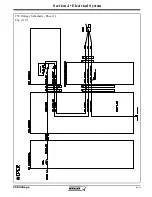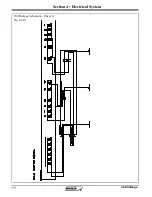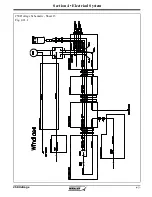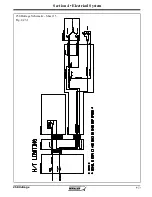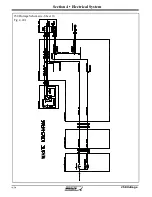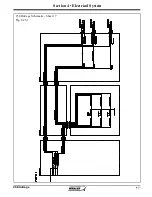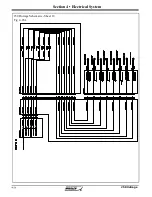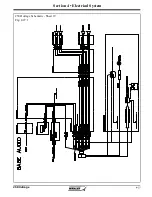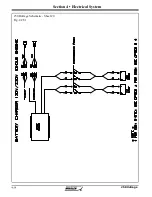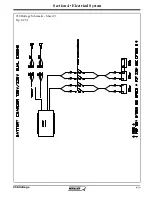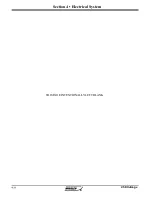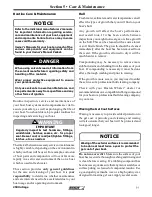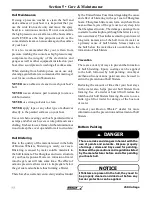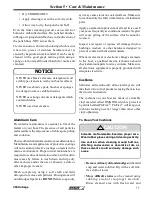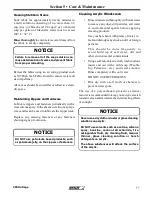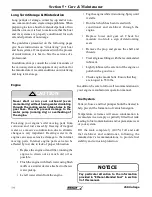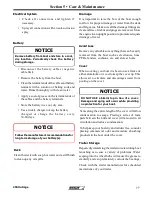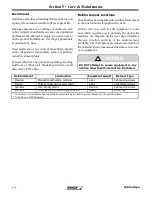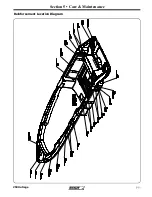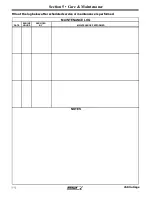
Section 5 • Care & Maintenance
250 Outrage
The gelcoat will have to be dewaxed of mold release
wax before sanding can begin, otherwise the wax
will be dragged into the scratches and will reduce
the adhesion properties of the paint.
Remove any mold release wax that may be present
using fi berglass surface prep solvent and a scrub
pad. Scrub only a few square feet at a time. Flush
with fresh water. If the water beads up or separates,
continue scrubbing the surface. When the water
sheets off , the wax contaminate has been removed.
After the dewaxing is complete, application of a
primer coat is recommended. Pay close attention to
scratches, nicks and dings in the surface. If necessary,
fi ll any repair areas with a watertite epoxy fi ller. After
fi ller is cured, sand with 80 grit paper until smooth.
Remove the sanding residue using a fi berglass solvent
wash.
The paint can be applied after sanding and cleaning
is complete. Follow the paint manufacturer’s
recommendations for application.
Bottom
Painting a Pre-Painted Hull
If your boat will spend most of its time in the water,
painting the bottom of your boat’s hull is a good way
to slow the formation of hull blisters and to keep
bottom growth (fouling) under control.
If you will be trailering the boat to and from the
water, you might want to forgo the painting.
Following is an abbreviated section on painting your
hull bottom. Your Boston Whaler
®
dealer should
have information on properly painting your boat’s
hull or recommendations on businesses that will
paint your hull for you.
Bottom Painting a Bare Hull
Since the boat has never been painted preparation is
the key to successful hull painting. Take extra care
and time in preparation before proceeding to paint.
Begin by scrubbing the surface thoroughly with a
stiff brush using an all-purpose marine soap and
water to remove loose dirt and contamination. Flush
with fresh water to remove all soap residue.
WARNING
Proper ventilation and capture of the dust
created by sanding is essential. The dust
created by sanding is toxic and should not be
breathed. A proper fi tting respirator must be
used.
DO NOT use a paper fi lter mask.
Zinc Anodes
Sacrifi cial anodes (zinc) are installed on the trim
tabs, and engines of your boat to protect underwater
hardware. Zinc, being less noble than copper based
alloys and aluminum used in underwater fi ttings, will
deteriorate fi rst and protect the underwater fi ttings
from deterioration.
Zinc anodes cannot perform their function unless
they are exposed. Putting paint on an anode
smothers it, rendering it useless.
DO NOT paint over zinc plates. This action will
render them usless and lead to deterioration of
the underwater metal parts of your boat.
CAUTION
Some bottom paints contain metals that can
cause corrosion of the outboard engine. Leave
a minimum of 3/4” unpainted around all engine
parts. Use only a paint specifi cally designed for
aluminum engines as anti fouling protection.
CAUTION
WARNING
Bottom paint is designed to resist algae growth
which means it has chemicals embedded in
the paint that are harmful if ingested. Take all
necessary precautions required before painting
or repainting your boat’s hull.
If the hull bottom is already painted, you must be
sure to test the paint’s adhesion to the already painted
surface. If the paints are incompatible, the new paint
will not adhere to the hull bottom or the paint will
“lift
” the old paint.
NEVER
apply paint without fi rst
Summary of Contents for 250 OUTRAGE
Page 1: ...i R 250 Outrage 250 Outrage ...
Page 2: ...ii R ...
Page 18: ...xviii î ï ð ñ ò ó ô õ ö R ø ù ú û ü ý þ ÿ ú ø ÿ ø ú ý ÿ ø ý ...
Page 42: ...1 24 Ë Ì Í Î Ï Ð Ñ Ò Ó Ô R Õ Ö Ø Ù Ú Û Ü Ý Õ Ü Ý Õ Þ Ý Ú ß ß à ß Ü á Õ â ß Ú Ý ã ...
Page 54: ...2 12 w x y z R ª ª ª ª ª ª ª ª ª µ ª º ª º µ ...
Page 72: ...2 30 µ R º À À Á À Â Ã À Ä ...
Page 111: ...250 Outrage Section 4 Electrical System 250 Outrage Schematic Sheet 1 Fig 4 9 1 ...
Page 112: ...250 Outrage Section 4 Electrical System 250 Outrage Schematic Sheet 2 Fig 4 10 1 ...
Page 113: ...250 Outrage Section 4 Electrical System 250 Outrage Schematic Sheet 3 Fig 4 11 1 ...
Page 114: ...250 Outrage Section 4 Electrical System 250 Outrage Schematic Sheet 4 Fig 4 12 1 ...
Page 115: ...250 Outrage Section 4 Electrical System 250 Outrage Schematic Sheet 5 Fig 4 13 1 ...
Page 116: ...250 Outrage Section 4 Electrical System 250 Outrage Schematic Sheet 6 Fig 4 14 1 ...
Page 117: ...250 Outrage Section 4 Electrical System 250 Outrage Schematic Sheet 7 Fig 4 15 1 ...
Page 118: ...250 Outrage Section 4 Electrical System 250 Outrage Schematic Sheet 8 Fig 4 16 1 ...
Page 119: ...250 Outrage Section 4 Electrical System 250 Outrage Schematic Sheet 9 Fig 4 17 1 ...
Page 120: ...250 Outrage Section 4 Electrical System 250 Outrage Schematic Sheet 10 Fig 4 18 1 ...
Page 121: ...250 Outrage Section 4 Electrical System 250 Outrage Schematic Sheet 11 Fig 4 19 1 ...
Page 122: ...250 Outrage Section 4 Electrical System 250 Outrage Schematic Sheet 12 Fig 4 20 1 ...
Page 123: ...250 Outrage Section 4 Electrical System 250 Outrage Schematic Sheet 13 Fig 4 21 1 ...
Page 124: ...250 Outrage Section 4 Electrical System 250 Outrage Schematic Sheet 14 Fig 4 22 1 ...
Page 125: ...250 Outrage Section 4 Electrical System 250 Outrage Schematic Sheet 15 Fig 4 23 1 ...
Page 126: ...250 Outrage Section 4 Electrical System 250 Outrage Schematic Sheet 16 Fig 4 24 1 ...
Page 127: ...250 Outrage Section 4 Electrical System 250 Outrage Schematic Sheet 17 Fig 4 25 1 ...
Page 128: ...250 Outrage Section 4 Electrical System 250 Outrage Schematic Sheet 18 Fig 4 26 1 ...
Page 129: ...250 Outrage Section 4 Electrical System 250 Outrage Schematic Sheet 19 Fig 4 27 1 ...
Page 130: ...250 Outrage Section 4 Electrical System 250 Outrage Schematic Sheet 20 Fig 4 28 1 ...
Page 131: ...250 Outrage Section 4 Electrical System 250 Outrage Schematic Sheet 21 Fig 4 29 1 ...
Page 132: ...250 Outrage Section 4 Electrical System THIS PAGE INTENTIONALLY LEFT BLANK ...
Page 143: ...Section 5 Care Maintenance 250 Outrage Reinforcement Location Diagram ...

